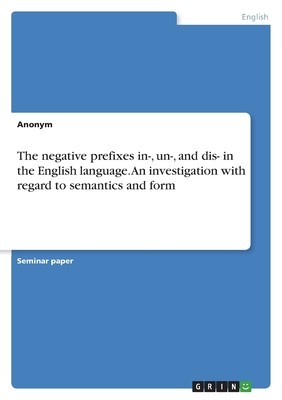
- We will send in 10–14 business days.
- Author: Anonym
- Publisher: GRIN Verlag
- Year: 2021
- Pages: 24
- ISBN-10: 334645200X
- ISBN-13: 9783346452009
- Format: 14.8 x 21 x 0.2 cm, softcover
- Language: English
- SAVE -10% with code: EXTRA
The negative prefixes in-, un-, and dis- in the English language. An investigation with regard to semantics and form (e-book) (used book) | bookbook.eu
Reviews
Description
Seminar paper from the year 2015 in the subject English Language and Literature Studies - Linguistics, grade: 1,3, University of Wuppertal, language: English, abstract: This analysis serves to find out whether these prefixes express different nuances of negativity. Do they have a meaning on their own or can they be considered synonymous as they all denote negativity? The negative prefixes in-, un- and dis- are all used to alter an affirmative statement into a negative one in order to signal oppositeness. They are considered rival prefixes. However, Bauer et al. point out that the attachment of different negative prefixes to the same base creates derivatives which are often not only formally but also semantically different.
EXTRA 10 % discount with code: EXTRA
The promotion ends in 20d.23:49:14
The discount code is valid when purchasing from 10 €. Discounts do not stack.
- Author: Anonym
- Publisher: GRIN Verlag
- Year: 2021
- Pages: 24
- ISBN-10: 334645200X
- ISBN-13: 9783346452009
- Format: 14.8 x 21 x 0.2 cm, softcover
- Language: English English
Seminar paper from the year 2015 in the subject English Language and Literature Studies - Linguistics, grade: 1,3, University of Wuppertal, language: English, abstract: This analysis serves to find out whether these prefixes express different nuances of negativity. Do they have a meaning on their own or can they be considered synonymous as they all denote negativity? The negative prefixes in-, un- and dis- are all used to alter an affirmative statement into a negative one in order to signal oppositeness. They are considered rival prefixes. However, Bauer et al. point out that the attachment of different negative prefixes to the same base creates derivatives which are often not only formally but also semantically different.


Reviews